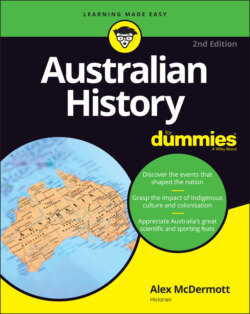Читать книгу Australian History For Dummies - Alex McDermott - Страница 74
LIFE ON THE FRONTIER: A LAND OF BRUTALITY AND OPPORTUNITY
ОглавлениеIn the first few years of settlement in Australia, convicts had about half of their working hours free to themselves. If a convict was assigned to daily task work, that meant no work after lunchtime, even if it spent the whole morning raining. If it was weekly task work, then a convict was generally free by about Thursday. A far cry from work conditions at this time in Britain (minors being sent to work, long working hours, poor conditions, exploitation, and so on).
Convicts were clothed, fed and housed at the expense of the government. Their masters tended to be people exactly like them — ex-convicts who had been granted land along with their freedom and had now been given convict labourers as well. The convicts would often live in the same hut as the family. These masters weren’t just owners of convict labour, weren’t only employers of convicts in their free time, but could be business partners as well: They would frequently offer profit-sharing schemes with the convicts they had living and working for them.
If you are looking for scenes of absolute squalor in this early period, you have to look quite selectively. Yes, plenty of floggings were dished out — for drunkenness, desertion of labour and being generally at large, and stealing — and hangings (like in Britain) remained frequent. But this doesn’t make NSW a place of misery. This makes it normal in the context of the period. Flogging took place everywhere — on ships, in schoolrooms and yards, with apprentices and servants in workplaces — with the Georgian age’s attitude towards corporal punishment being vastly different to most attitudes today.
For those trying to carve out a life on a farm, the conditions were no joke: Small land grants covered in bush and scrub had to be cleared; the soil was often of low fertility, and subject to the vagaries of a new climate — not to mention the often extortionate prices being charged for supplies by various traders and retailers. All of this added to the hardship of living in a frontier environment. Many preferred to sell up and move back into Sydney town (where demand for labour was high and the pay good) and get work there. But some stuck with their land grants, picked up more land, and used their allocated convict labour to run livestock and grow cash crops. Slowly the criminal class that had arrived en masse from Britain were becoming settlers in a new country.
NSW in the early years, then, was a place of casual brutality, squalor and frontier hardship, yet simultaneously a place of remarkable and unprecedented opportunity for the outcasts and criminal ‘refuse’ who were sent here. The colony turned out to be an unexpected jackpot for many convicts, far better than anything they could have reasonably expected if they’d remained in the Britain they knew — either locked in a rural yet landless poverty or the London underclass.
